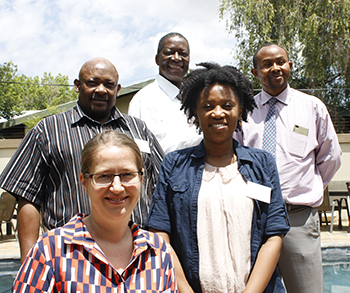
Dr Kristina Riedel, Head of the UFS Department of
Linguistics and Language Practice; middle:
Prof Nancy Kula, of the University of Essex; back:
from left, Dr Elias Malete, lecturer at the UFS
Department of Linguistics and Language Practice,
Prof Andy Chebanne, from the University of Botswana;
and Lesoetsa Motsamai, from the University of Stellenbosch,
at the SAMWOP workshop on 24 November 2016.
Photo: Rulanzen Martin
“The Southern African Microlinguistics Workshop (SAMWOP) creates space for sharing the latest research, networking and building stronger collaboration amongst linguists.”
This is what Dr Kristina Riedel, Head of the Department of Linguistics and Language Practice at the University of the Free State (UFS), said of the 5th SAMWOP hosted by her department. The workshop, hosted from 24 to 26 November 2016, also provided linguists who work on theory and language description in South Africa, the opportunity to network. “As a free conference it is very important, particularly for students and junior scholars.”
International delegates attend workshop
Participants at the workshop were from eight countries including the US, Botswana, Mozambique, Brazil and the UK. Prof Nancy Kula (University of Essex, UK), who was recently appointed as research associate to the department, presented jointly with Xiaoxi Liu, work on depressor effects (consonants which lower tones) in Bantu languages. Other presenters discussed Bantu languages, Khoisan languages and Afrikaans.
Microlinguistics analyses language and sound
“Microlinguistics focuses on analysing language data that deals with language sounds, structures and meaning, rather than language in society,” Dr Riedel said. “The range and diversity of the research on African languages presented at SAMWOP5 were a true highlight. There is a need for more research into African languages and SAMWOP presents the opportunity to scholars in the field to share their work, including in the accredited open-access proceedings.
“We are happy that we were able to hold a very successful and well-attended workshop despite the disruptions to the academic calendar this year,” the professor said.
The Linguistics Society of Southern Africa supported the cause in the form of a grant with additional support from the Office of Dean of Humanities at the UFS.